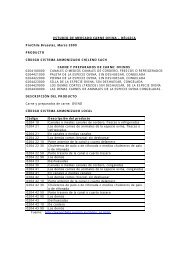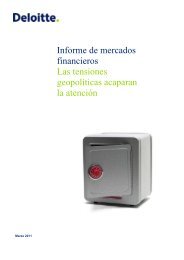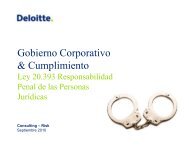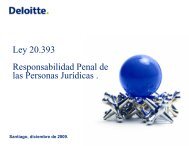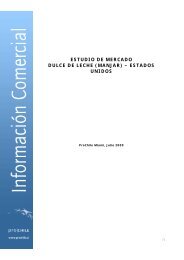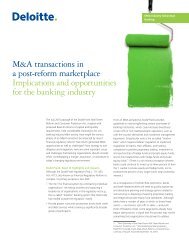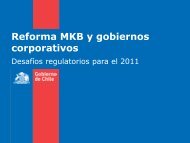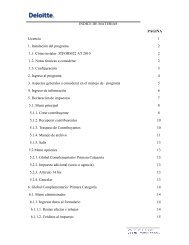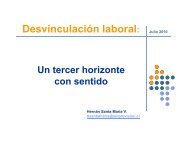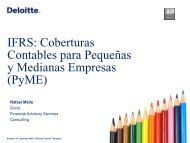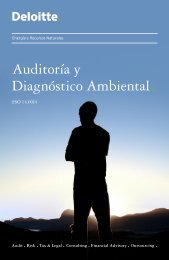Tax Advisers - Deloitte
Tax Advisers - Deloitte
Tax Advisers - Deloitte
You also want an ePaper? Increase the reach of your titles
YUMPU automatically turns print PDFs into web optimized ePapers that Google loves.
South Africa<br />
New advance tax ruling<br />
system promotes certainty<br />
Michael Honiball<br />
KPMG<br />
Johannesburg<br />
South Africa has a relatively sophisticated residence-based tax<br />
system. It incorporates many best-practice tax principles from<br />
other jurisdictions, and many aspects of the system are unique.<br />
Some provisions, like the CFC rules, are also extremely<br />
complex. Due to the relative complexity of the legislation and<br />
a backlog of court cases, there are many areas of uncertainty<br />
for taxpayers. There also appears to be a trend by the courts to<br />
move from a traditional, literal interpretation of statutes, to a<br />
more purposive interpretation, creating further uncertainty.<br />
Until now, South African Revenue Service (SARS) rulings<br />
were difficult to obtain and generally were not binding. An<br />
exception was certain VAT Rulings, which were regarded as<br />
effectively being of a binding nature. Practice and<br />
Interpretation Notes issued by the Service were also not<br />
binding, and in some court cases the Service even argued against their own Practice<br />
Notes when it suited them!<br />
The implementation of the new advance tax ruling system, backdated to October 1<br />
2006, was therefore generally welcomed by South African advisers and taxpayers. The<br />
previous system of non-binding rulings essentially remains as before, except that<br />
certain VAT Rulings previously issued change their status from January 1 2007, from<br />
binding rulings to so-called opinions.<br />
The implementation of the new ATR system follows international best practice. For<br />
example, Australia and New Zealand already have such a system, and on November 17<br />
2006, the UK HMRC published a report on large-company tax administration that<br />
included a recommendation to introduce a system of advance rulings for businesses by<br />
the end of 2007.<br />
The rationale behind the UK recommendations, as was the case in South Africa, is the<br />
need for more certainty about the tax treatment of company transactions as well as the<br />
speedier resolution of taxpayer issues. The argument is that if a binding ruling has<br />
been obtained, an assessment can more quickly be issued and need not be questioned<br />
by a tax authority before the expiry of the relevant prescription period.<br />
Key features of the new ATR system<br />
The Commissioner for the South African Revenue Service can issue two types of<br />
rulings under the new ATR system: Binding Private Rulings and Binding General<br />
Rulings.<br />
A Binding Private Ruling is an advance tax ruling, issued in response to an application,<br />
that states how the commissioner would interpret and apply provisions of South<br />
African tax law to a specific proposed transaction. A Binding General Ruling is an<br />
advance tax ruling that is issued by the commissioner, at his discretion, regarding the<br />
application or interpretation of a provision of South African tax law in respect of issues<br />
or matters of general interest or importance. The latter ruling is not issued in response<br />
to any application. Both types of rulings are binding on the commissioner, but not on<br />
the taxpayer. Furthermore, the binding effect of a Binding Private Ruling only applies<br />
to the applicant who requested the ruling, and may not be cited as precedent by any<br />
other taxpayer.<br />
A Binding Private Ruling may be rendered void or lose its binding effect if the facts<br />
stated in the application are materially different from the transaction actually<br />
implemented, if there is fraud or misrepresentation or if any condition stipulated on<br />
the Ruling is not satisfied. Furthermore, if there is a subsequent change in the relevant<br />
tax law, or if the commissioner withdraws the ruling, it will cease to apply.<br />
181




